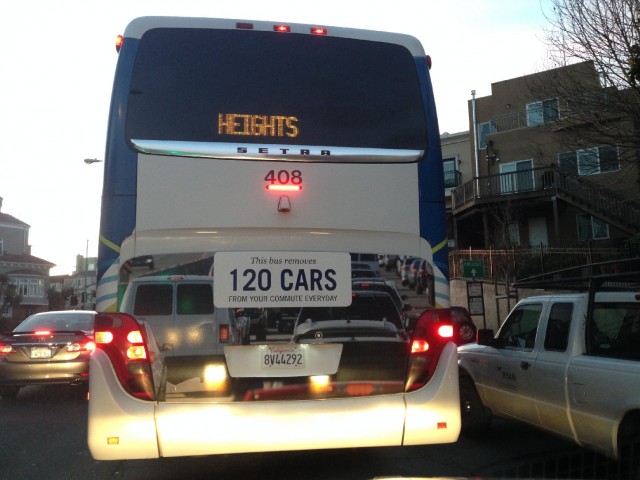Today on Bay Area Bus Wars ...

That's the Genentech bus, transporting passengers through the Marina this morning on its way to the company's South San Francisco office. The idea presumably being that the message "This bus removes 120 cars from your commute everyday" will make drivers stuck behind the lumbering vehicle think it's a small price to pay for fighting climate change -- although, as pointed out by the Chronicle today, "Everyday" should be "every day." So, for every two protesters that sentiment removes from the streets, one livid English teacher will emerge.
A Genentech spokesperson told the Chron that the new slogan, which started appearing in December, isn't a response to the multiple Bay Area protests against the Google bus, which has become a symbol of privilege in a time when many blame the influx of new tech workers for evictions and high housing prices.
Some, of course, have made the very argument that the new Genentech slogan does: The buses are a great idea environmentally.
A year ago, local author Rebecca Solnit wrote one of the seminal broadsides against the buses in the "London Review of Books." As News Fix's Dan Brekke wrote last month...
Solnit’s piece was a sort of declaration that the buses are a key part of the engine remaking the city in a particularly unfriendly way for anyone not employed with the technology industry or engaged in some other lucrative enterprise. “Most of them are gleaming white,” she wrote in opening the essay, “with dark-tinted windows, like limousines, and some days I think of them as the spaceships on which our alien overlords have landed to rule over us.”
In response, Ben Adler of Grist, an environmentalist news site, wrote a critique of that line of argument ...
Solnit’s complaint that Google thinks its employees are too important to “drive themselves” is backward and nonsensical. Driving in one’s own private car is far more elitist than sharing a bus with one’s coworkers. It is also vastly worse for the environment. The buses take cars off the road. Fewer cars mean less traffic, and less idling in traffic, which is especially polluting.
Solnit hit back last month with another essay, called "Resisting Monoculture," in the magazine "Guernica."
Most people (including Adler at one point in his all-over-the-place piece) wonder why people who work 40 miles away should travel those 80 miles daily down and back one of the more congested freeways around. The buses encourage them to pursue this geographical ridiculousness. And thus come the well-paid engineers to San Francisco, and thus go the longtime activists, idealists, artists, teachers, plumbers, all the less-well-paid people.
On the surface, perhaps, any ride-sharing program may seem green and community-building, but the effects of the Google bus on the ecosystem of San Francisco are complicated. One of the organizers of the Google bus blockade last month just wrote me, in response to Adler’s piece, “The idea that all of the techies would choose to live in SF and drive to Silicon Valley if not for the buses is a total exaggeration. Half the techies surveyed by the San Francisco Municipal Transit Agency said they wouldn’t drive by themselves (only 3% would carpool) & 31% said they wouldn’t be able to make the trip at all according to info I found in SFMTA’s Private Commuter Shuttles Policy Draft Proposal. The proposal also notes the ‘Google’ buses’ average dwell time (at bus stops) is 3x that of the Muni.” So the buses aren’t creating greener transit for people who’d live here anyway. They’re also enabling long-distance commuters who wouldn’t live here otherwise.
The controversy is so intense that master's candidates have been doing their theses on it. Here's one from a UC Berkeley student called "The Google Shuttle Effect: Gentrification and San Francisco's Dotcom Boom 2.0." And here's a more recent one from UC Berkeley called "Riding First Class: Impacts of Silicon Valley Shuttles on Commute & Residential Location Choice."